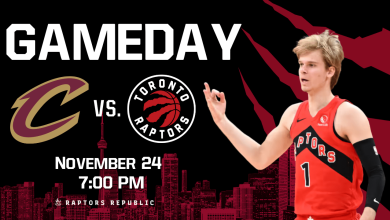‘Who Killed the Montreal Expos?’ Netflix Review: Stream It Or Skip It?

In 1994, the Montreal Expos were the best team in baseball. A decade later, they were gone, moved to Washington and renamed the Nationals. How did Major League Baseball’s first international franchise–and one of its most charismatic baseball settings–meet its untimely end? Who Killed the Montreal Expos?, a new feature-length documentary on Netflix that’s been released just in time for the 2025 World Series, attempts to answer that question.
The Gist: Who Killed the Montreal Expos? brings in a wide range of figures from around the team, including a number of prominent former players, journalists, team employees, former co-owner Claude Brochu, former team president Jeffrey Loria, and even the team’s former mascot. They’re brought in for a whodunit — examining the many factors in the team’s demise — and possibly identifying a murderer.
What Movies Will It Remind You Of?: Structurally, there’s tones of ESPN’s much-lauded Chicago Bulls docuseries The Last Dance, in the way this movie eschews a linear timeline for storytelling purposes. Emotionally, there’s parallels to other postmortems on teams taken away from their fans, such as the Baltimore Colts-focused 30 For 30 episode The Band That Wouldn’t Die, or the Cleveland Browns-focused A Football Life episode “Cleveland ‘95”.
Photo: Netflix
Performance Worth Watching: There’s a deep cast of faces familiar to baseball fans here, including Hall of Famers like Pedro Martinez, Larry Walker, Vladimir Guerrero Sr. and more — reminders of just how good the Expos were before the 1994 strike derailed things. Still, no one elicited more of a finger-pointing-Leo reaction from me than Jean-Simon Bibeau, the performer inside the Youppi! Costume. That’s Expos baseball.
Memorable Dialogue: “It was a great atmosphere, and I felt so comfortable. They took me under their arms,” former Expos star pitcher Dennis Martinez recalls. “It was always so much fun to be across the border,” recalls Hall of Famer Pedro Martinez. “Safe, no guns, no violence, nothing.” “It was a fun place to be when we were playing good,” adds fellow HOFer Larry Walker. “When that place was full and we were playing our best baseball, there wasn’t another ballpark in the league that was louder.”
Sex and Skin: Youppi! doesn’t wear pants, but he’s covered in fur.
Photo: Courtesy of Netflix
Our Take: “People don’t understand how far back baseball goes in Montreal,” former Expos player, baseball Hall of Famer and current television commentator Pedro Martinez contends. We’re reminded of the city’s long history with the game, where baseball thrived in the first half of the 20th century, and where Black players were able to play before integration. This montage plays slightly defensive, but it’s necessary to remind viewers why Montreal got the Expos in the first place–before Toronto, before any other city outside of the United States. Montreal was a real, great baseball city, one as worthy of an expansion team as Kansas City, Seattle, Anaheim or anywhere else.
There’s enough flashes of the glory days in Montreal to show us that the decision to award the city a franchise wasn’t a mistake. Olympic Stadium may have been a strange venue, but when the Expos were winning, it was a raucous, loud environment full of passionate fans. In the early ‘90s, the team peaked under manager Felipe Alou, the patriarch of a legendary baseball family leading a team loaded with star talent. In 1994, this team had the best record in the majors — that is, until MLB owners’ push for a salary cap led to a strike that ended the season. During the long offseason, the teams’ stars were shipped off, the roster stripped for parts, and baseball was never the same in Montreal.
The strike isn’t presented as the only factor in the Expos’ demise, far from it, but a tipping point for a franchise hampered by a number of unique factors. These include the weakness of the Canadian dollar, unfavorable political conditions, a crumbling stadium ill-suited for baseball, the lack of Quebecois billionaires to buy the team once the sport became a big business, and various figures who didn’t have the city’s best interests in mind.
One oft-cited villain joins for the discussion here.
David Samson, the team president brought in under new owner Jeffrey Loria in 1999, made quite an impression from the start. “David Samson arrived with a certain style,” former Expos player and baseball analyst Marc Griffin recalls. “He carried a mirror everywhere he went so he could see himself,” another figure close to the team recalls. “Arrogant, self-satisfied, he looked at you as if you were crap,” journalist Serge Touchette adds, with no small amount of lingering resentment. I’ve yet to meet someone who likes him. I’ve never met anyone so despicable.” We cut directly from these quotes to a smug, smiling Samson sitting for an interview, looking exactly as described. “If you don’t have a healthy dose of arrogance, you can’t run a company,” Samson shares in the voice of every character about to shut down a beloved business in a movie. Still, he denies holding the murder weapon. “Did I alone kill the Expos in Montreal? As egotistical as I can be, there’s no way that is possible.” As disagreeable as he comes across, he makes a case for the situation having been dire. “People thought that Jeffrey Loria would come in and all of a sudden the team would be saved, and everything would be great, but I don’t think they were fully aware of how toxic it was in Montreal long before we even got there.”
This isn’t a simple whodunit with a clear-cut answer, but identifying one killer is almost beside the point. Baseball was a more charming sport before every franchise became a billion-dollar business; it was a more charming sport when you could have a team like the Montreal Expos (or, for a more recent example, the Oakland A’s.)
Even if you’re not an Expos fan, Who Killed the Montreal Expos? makes you feel that loss.
Our Call: STREAM IT. Who Killed the Montreal Expos? is a proper elegy for a lost team, but more than that, it’s an encapsulation of what was lost as pro sports teams became billion-dollar businesses.
Scott Hines, publisher of the widely-beloved Action Cookbook Newsletter, is an architect, blogger and proficient internet user based in Louisville, Kentucky.





